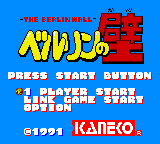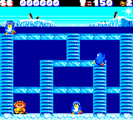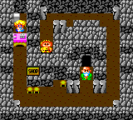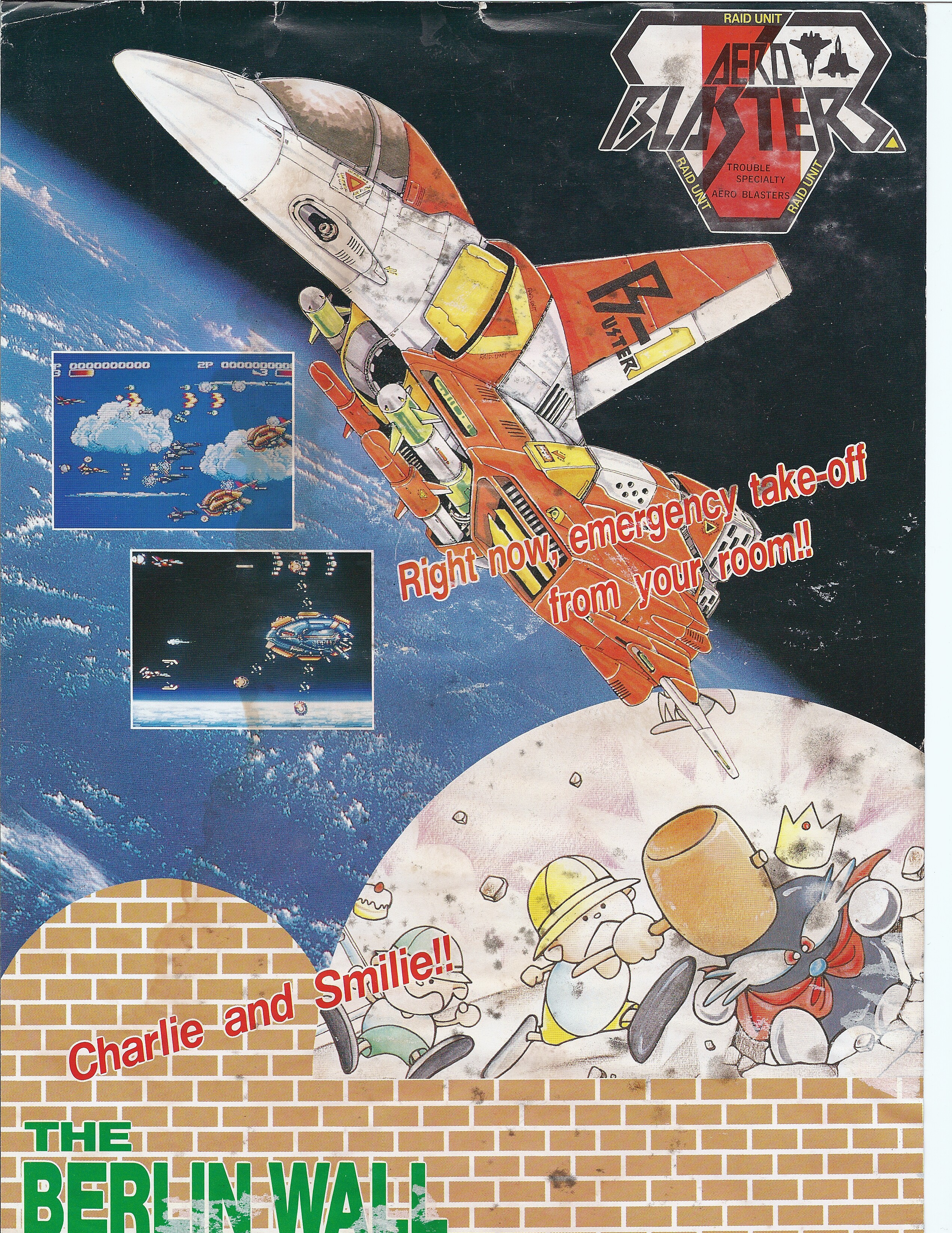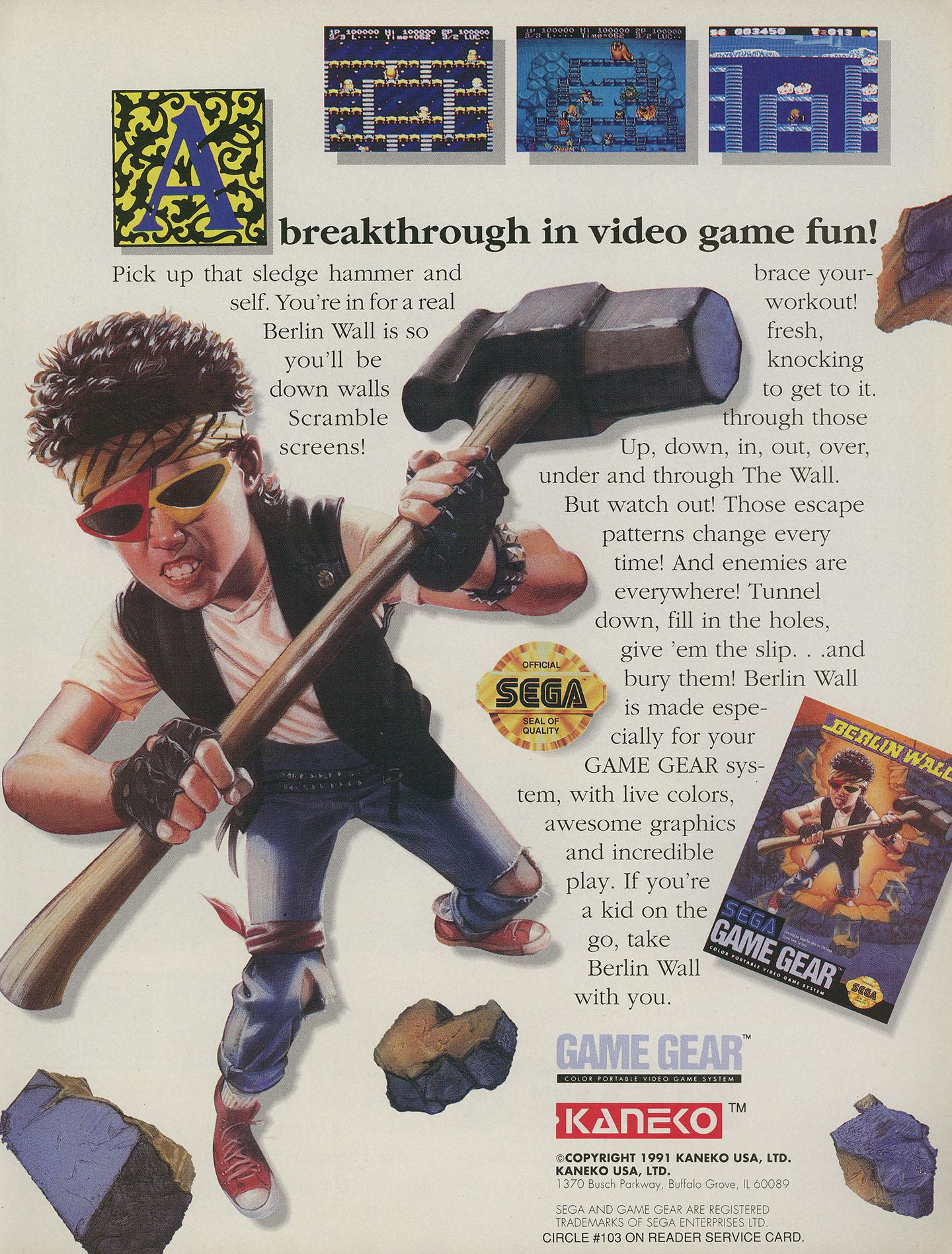Difference between revisions of "Berlin no Kabe"
From Sega Retro
| Line 4: | Line 4: | ||
| developer=[[Inter State]]{{ref|http://gdri.smspower.org/wiki/index.php/Inter_State}} | | developer=[[Inter State]]{{ref|http://gdri.smspower.org/wiki/index.php/Inter_State}} | ||
| system=[[Sega Game Gear]] | | system=[[Sega Game Gear]] | ||
| − | | sounddriver= | + | | sounddriver= |
| peripherals= | | peripherals= | ||
| players=1 | | players=1 | ||
Revision as of 08:41, 18 April 2024
| Berlin no Kabe | ||||||||||
|---|---|---|---|---|---|---|---|---|---|---|
| System(s): Sega Game Gear | ||||||||||
| Publisher: Kaneko[1] | ||||||||||
| Developer: Inter State[1] | ||||||||||
| Genre: Action[2][3] | ||||||||||
| Number of players: 1 | ||||||||||
|
Berlin no Kabe (ベルリンの壁) is a Sega Game Gear puzzle action game developed by Inter State[1] and published by Kaneko.[1] A port of the publisher's 1991 arcade game The Berlin Wall, it was released exclusively in Japan in November 1991.
A United States release was once advertised, but ultimately cancelled for unknown reasons.[5]
Contents
Story
A boy must rescue his mother, who has become trapped in Berlin World behind a wall. A mysterious old man gives the boy a magical hammer to use.
Gameplay
The game is a puzzle platformer. Each stage is a single screen with no scrolling and consists of ladders and platforms. The player takes control of a young boy who must use his hammer to break the floors of the stages. These holes act as traps for the many patrolling, multi-colored monsters. Once one has fallen into a hole, the player has a limited time to use the hammer on the monster (or jump on it from a higher platform) to make it fall through the hole and down to the platform below, causing it to transform into items that can then be collected (and also restoring the platforms of any holes that they fall through). Monsters explode when they are defeated, which can defeat other nearby enemies. The behavior of enemies varies depending on their color, with blue and green enemies having simple movement patterns and yellow and red enemies being more aggressive. The stage ends when all of the monsters have been defeated.
Each world consists of five levels and a boss fight. There is a two-player mode where two players cooperate and play simultaneously over a Gear-to-Gear Cable.
The boy walks with ![]() and
and ![]() and climbs ladders with
and climbs ladders with ![]() and
and ![]() . Falling through the bottom of the screen causes him to loop around and fall back through. He swings his hammer with
. Falling through the bottom of the screen causes him to loop around and fall back through. He swings his hammer with ![]() , which cannot be used to attack enemies directly but can be used to break holes in platforms. It takes three swings to dig a hole. The boy can cover a hole when standing adjacent to it with
, which cannot be used to attack enemies directly but can be used to break holes in platforms. It takes three swings to dig a hole. The boy can cover a hole when standing adjacent to it with ![]() , so he can walk over it again.
, so he can walk over it again.
Each world contains one stage in which, if certain conditions are met, a door appears that transports the boy to an area with a shop where the player can buy special items with points and play a quick bonus stage for more points:[6]
- Stage 1-5: Defeat all enemies.
- Stage 2-3: Defeat all enemies.
- Stage 3-1: Make the thousands digit of the score even.
- Stage 4-3: Fall off a platform at least 15 times before the last enemy is destroyed.
- Stage 5-2: Dig exactly 7 holes by the end of the stage.
If the player finds all of the secret doors, the boy fights all five bosses again to receive the good ending (which includes pictures of the actual Berlin Wall, which had fallen two years prior).
The boy loses a life if he touches a monster but revives if the player has extra lives remaining. Stages are timed, and the boy loses a life and must restart the stage if time runs out. The game ends if the player runs out of lives, also losing any item effects, but it can be continued if the player has credits remaining. The player can set the starting lives and credits in the options before starting the game.
Items
Stages
These items are dropped by defeated monsters in stages.
Shop
These items can be bought in the shop in exchange for points. Item effects last until the player gets a game over.
Stages
- Main article: Berlin no Kabe/Maps.
History
Legacy
The original arcade game was also ported to the Sega Mega Drive in January 1992 as Wani Wani World.
Production credits
| This article needs a list of production credits, either from the game itself, a manual, or other reliable source. Source: Berlin no Kabe GG credits.pdf |
Magazine articles
- Main article: Berlin no Kabe/Magazine articles.
Promotional material
Physical scans
| Sega Retro Average | ||||||||||||||||||||||||||||||||||||||||||||||||||||||
|---|---|---|---|---|---|---|---|---|---|---|---|---|---|---|---|---|---|---|---|---|---|---|---|---|---|---|---|---|---|---|---|---|---|---|---|---|---|---|---|---|---|---|---|---|---|---|---|---|---|---|---|---|---|---|
|
| 68 | |
|---|---|
| Based on 10 reviews | |
Technical information
ROM dump status
| System | Hash | Size | Build Date | Source | Comments | |||||||||
|---|---|---|---|---|---|---|---|---|---|---|---|---|---|---|
| ? |
|
256kB | Cartridge (JP) |
External links
References
- ↑ 1.0 1.1 1.2 1.3 http://gdri.smspower.org/wiki/index.php/Inter_State
- ↑ File:BerlinWall GG JP Box Front.jpg
- ↑ 3.0 3.1 http://sega.jp/fb/segahard/gg/soft_licensee.html (Wayback Machine: 2013-01-01 20:24)
- ↑ Mega Drive Fan, "July 1991" (JP; 1991-06-08), page 92
- ↑ File:BerlinWall GG US PrintAdvert.jpg
- ↑ https://www.smspower.org/Cheats/BerlinNoKabe-GG
- ↑ Beep! MegaDrive, "July 1991" (JP; 1991-06-08), page 32
- ↑ Console XS, "June/July 1992" (UK; 1992-04-23), page 147
- ↑ Famitsu, "1991-12-06" (JP; 1991-11-22), page 42
- ↑ Hippon Super, "July 1991" (JP; 1991-06-04), page 115
- ↑ Joystick, "Janvier 1992" (FR; 199x-xx-xx), page 115
- ↑ Power Play, "5/92" (DE; 1992-04-15), page 159
- ↑ Sega Pro, "February 1992" (UK; 1992-01-16), page 32
- ↑ Sega Pro, "April 1993" (UK; 1993-03-11), page 74
- ↑ Sega Saturn Magazine, "September 1995" (JP; 1995-08-08), page 88
- ↑ Video Games, "2/92" (DE; 1992-04-06), page 93
| Berlin no Kabe | |
|---|---|
|
Main page | Maps | Development | Magazine articles | Reception | |
